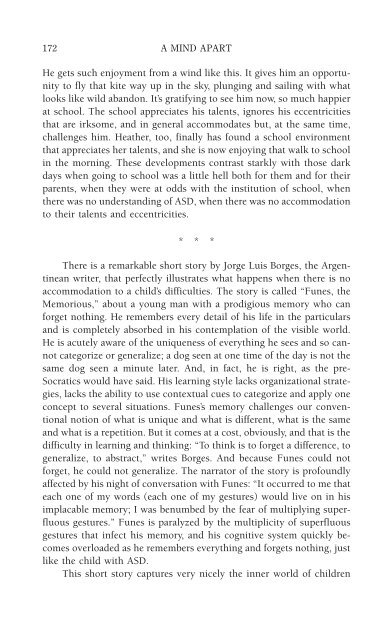978-1572305441
autism
autism
Create successful ePaper yourself
Turn your PDF publications into a flip-book with our unique Google optimized e-Paper software.
172 A MIND APART<br />
He gets such enjoyment from a wind like this. It gives him an opportunity<br />
to fly that kite way up in the sky, plunging and sailing with what<br />
looks like wild abandon. It’s gratifying to see him now, so much happier<br />
at school. The school appreciates his talents, ignores his eccentricities<br />
that are irksome, and in general accommodates but, at the same time,<br />
challenges him. Heather, too, finally has found a school environment<br />
that appreciates her talents, and she is now enjoying that walk to school<br />
in the morning. These developments contrast starkly with those dark<br />
days when going to school was a little hell both for them and for their<br />
parents, when they were at odds with the institution of school, when<br />
there was no understanding of ASD, when there was no accommodation<br />
to their talents and eccentricities.<br />
* * *<br />
There is a remarkable short story by Jorge Luis Borges, the Argentinean<br />
writer, that perfectly illustrates what happens when there is no<br />
accommodation to a child’s difficulties. The story is called “Funes, the<br />
Memorious,” about a young man with a prodigious memory who can<br />
forget nothing. He remembers every detail of his life in the particulars<br />
and is completely absorbed in his contemplation of the visible world.<br />
He is acutely aware of the uniqueness of everything he sees and so cannot<br />
categorize or generalize; a dog seen at one time of the day is not the<br />
same dog seen a minute later. And, in fact, he is right, as the pre-<br />
Socratics would have said. His learning style lacks organizational strategies,<br />
lacks the ability to use contextual cues to categorize and apply one<br />
concept to several situations. Funes’s memory challenges our conventional<br />
notion of what is unique and what is different, what is the same<br />
and what is a repetition. But it comes at a cost, obviously, and that is the<br />
difficulty in learning and thinking: “To think is to forget a difference, to<br />
generalize, to abstract,” writes Borges. And because Funes could not<br />
forget, he could not generalize. The narrator of the story is profoundly<br />
affected by his night of conversation with Funes: “It occurred to me that<br />
each one of my words (each one of my gestures) would live on in his<br />
implacable memory; I was benumbed by the fear of multiplying superfluous<br />
gestures.” Funes is paralyzed by the multiplicity of superfluous<br />
gestures that infect his memory, and his cognitive system quickly becomes<br />
overloaded as he remembers everything and forgets nothing, just<br />
like the child with ASD.<br />
This short story captures very nicely the inner world of children



